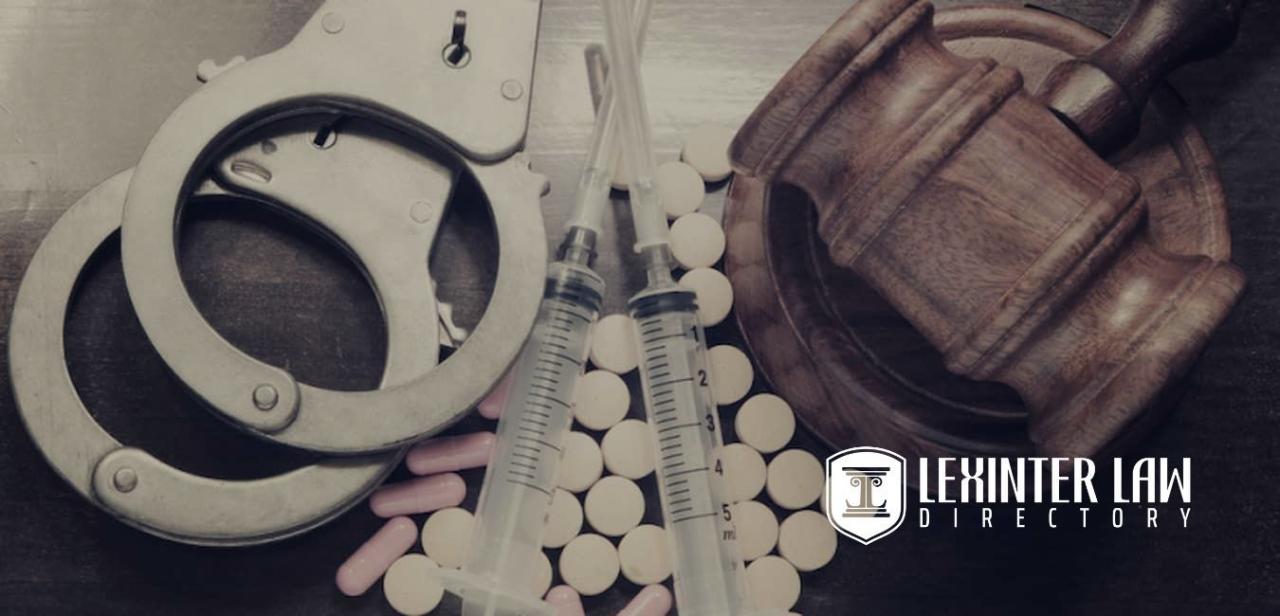
Introduction

Drug offenses are a significant societal concern, involving the unlawful possession, use, or distribution of controlled substances. Their prevalence has far-reaching consequences, affecting individuals, families, and communities.
Prevalence of Drug Offenses
Drug offenses are prevalent worldwide, with millions of arrests and convictions annually. In the United States alone, drug arrests account for a substantial portion of all arrests. According to the Federal Bureau of Investigation’s Uniform Crime Reporting Program, in 2021, there were over 1.6 million drug arrests, representing approximately 15% of all arrests.
Types of Drug Offenses
Drug offenses encompass a wide range of activities related to the illegal possession, distribution, or manufacture of controlled substances. The severity of the offense and the associated penalties vary depending on the type of drug involved, the quantity, and the intent of the offender.
Here are the common types of drug offenses:
Possession
Possession of drugs refers to the illegal possession of a controlled substance without the intent to sell or distribute it. The penalties for possession vary depending on the type and quantity of the drug. For example, simple possession of marijuana may result in a misdemeanor charge, while possession of large amounts of cocaine or heroin can lead to felony charges and severe penalties.
Distribution
Distribution of drugs involves the illegal sale or transfer of a controlled substance to another person. Drug distribution offenses are typically more serious than possession offenses and carry harsher penalties. The penalties for distribution vary depending on the type and quantity of the drug, as well as the intent of the offender.
Manufacturing
Manufacturing of drugs refers to the illegal production of a controlled substance. Drug manufacturing offenses are the most serious type of drug offense and carry the most severe penalties. The penalties for manufacturing vary depending on the type and quantity of the drug, as well as the intent of the offender.
Role of Drug Offense Lawyers

In the criminal justice system, drug offense lawyers play a crucial role in protecting the rights of individuals charged with drug-related crimes. They navigate the complex legal process on behalf of their clients, ensuring their rights are upheld and providing strategic guidance throughout the case.
Drug offense lawyers are equipped with a deep understanding of drug laws and criminal procedure, enabling them to develop effective defense strategies tailored to each client’s unique circumstances. They are skilled negotiators who can advocate for favorable plea agreements or pursue dismissal of charges when possible.
Importance of Finding an Experienced Drug Offense Lawyer
Selecting an experienced and qualified drug offense lawyer is paramount. A skilled attorney can make a significant difference in the outcome of a case. They will possess a proven track record of success in handling drug-related cases, demonstrating their expertise and ability to navigate the legal system effectively.
Experienced drug offense lawyers have established relationships with prosecutors and judges, which can be beneficial in negotiations and case resolutions. They are also well-versed in the latest legal developments and case precedents, ensuring that their clients receive the most up-to-date and effective legal representation.
Defenses to Drug Offenses
Facing drug charges can be a daunting experience, but it’s crucial to remember that you have legal options to defend yourself. Understanding the common defenses to drug offenses can empower you to navigate the legal process effectively.
There are several defenses that can be raised in drug offense cases, each with its own specific requirements and potential outcomes. Some of the most common defenses include:
Entrapment
Entrapment occurs when law enforcement induces a person to commit a crime that they would not have otherwise committed. In order to establish entrapment, the defendant must show that:
- The government’s conduct created a substantial risk that the defendant would commit the crime.
- The defendant was not predisposed to commit the crime.
Lack of Knowledge
In some cases, a defendant may not be aware that they are in possession of drugs or that the drugs are illegal. For example, someone may unknowingly possess drugs that were planted on them or that were given to them by someone else.
Medical Necessity
In certain circumstances, a defendant may have a valid medical reason for possessing or using drugs. For example, a patient may be prescribed marijuana for medical purposes or a doctor may prescribe opioids to manage pain.
Successful Defenses to Drug Offenses
There have been numerous successful defenses to drug offenses based on the aforementioned defenses. For instance, in the case of U.S. v. Jacobson, the defendant was acquitted of drug trafficking charges after arguing that he was entrapped by a government informant.
In another case, People v. Murphy, the defendant was convicted of drug possession but successfully appealed the conviction on the grounds that he lacked knowledge of the drugs being in his car.
Importance of a Strong Defense
Presenting a strong defense to drug charges is essential for achieving a favorable outcome. An experienced drug offense lawyer can help you identify and assert the most appropriate defenses based on the facts of your case. By effectively defending yourself, you can potentially avoid harsh penalties and protect your future.
Sentencing for Drug Offenses
When sentencing drug offenders, judges consider various factors, including the severity of the offense, the defendant’s criminal history, and the impact of the crime on the community. The type of sentence imposed can vary widely depending on these factors.
Sentences for drug offenses can include:
- Probation: A period of supervision by a probation officer, with conditions such as drug testing and counseling.
- Fines: Monetary penalties imposed by the court.
- Community service: Unpaid work performed for the benefit of the community.
- Jail or prison time: Incarceration in a local jail or state prison.
The length of a sentence can also vary depending on the severity of the offense and the defendant’s criminal history. For example, first-time offenders with minor drug offenses may receive probation or a short jail sentence, while repeat offenders with more serious drug offenses may receive a lengthy prison sentence.
In addition to the above, some jurisdictions have sentencing guidelines for drug offenses. These guidelines provide judges with a framework for determining an appropriate sentence based on the specific facts of the case.
Alternatives to Incarceration

Incarceration is not always the most appropriate or effective response to drug offenses. Alternatives to incarceration can provide opportunities for rehabilitation, reduce recidivism, and save taxpayer money.
There are a variety of alternatives to incarceration available for drug offenses, including:
- Probation
- Drug treatment programs
- Community service
Probation
Probation is a court-ordered sentence that allows a defendant to remain in the community under the supervision of a probation officer. Probation can include a variety of conditions, such as attending drug treatment programs, submitting to drug testing, and avoiding contact with known drug users.
Probation can be a good option for defendants who are not a danger to the community and who are likely to benefit from rehabilitation. Probation can also be used as a way to transition defendants from incarceration back into the community.
Drug Treatment Programs
Drug treatment programs can provide defendants with the tools they need to overcome their addiction and live drug-free lives. Drug treatment programs can include a variety of services, such as counseling, medication-assisted treatment, and support groups.
Drug treatment programs can be a good option for defendants who are struggling with addiction and who are motivated to change. Drug treatment programs can also be used as a way to reduce recidivism and save taxpayer money.
Community Service
Community service can provide defendants with an opportunity to give back to their community and make amends for their crimes. Community service can include a variety of activities, such as working at a soup kitchen, volunteering at a homeless shelter, or cleaning up a park.
Community service can be a good option for defendants who are not a danger to the community and who are willing to take responsibility for their actions. Community service can also be used as a way to reduce recidivism and save taxpayer money.
Eligibility for Alternatives to Incarceration
The eligibility requirements for alternatives to incarceration vary from state to state. In general, defendants who are not a danger to the community and who are likely to benefit from rehabilitation are eligible for alternatives to incarceration.
Defendants who have a history of violent crime or who are facing serious drug charges may not be eligible for alternatives to incarceration. The decision of whether or not to grant an alternative to incarceration is made by the judge on a case-by-case basis.
Expungement and Restoration of Rights
Expungement and restoration of rights are processes that allow individuals convicted of drug offenses to have their criminal records cleared and their rights restored. This can provide numerous benefits, including improved employment and housing opportunities, as well as the ability to vote and serve on juries.
Eligibility Requirements for Expungement and Restoration of Rights
The eligibility requirements for expungement and restoration of rights vary from state to state. However, in general, individuals must have completed their sentences, including any probation or parole, and must not have any pending criminal charges. Additionally, some states require a waiting period before an individual can apply for expungement or restoration of rights.
Process for Expungement and Restoration of Rights
The process for expungement and restoration of rights also varies from state to state. However, in general, individuals must file a petition with the court. The petition must include information about the individual’s criminal history, as well as any evidence of rehabilitation. The court will then review the petition and make a decision.
Examples of Successful Expungements and Restorations of Rights
There are many examples of successful expungements and restorations of rights. For example, in 2019, a man in California had his drug conviction expunged after he completed a drug treatment program and obtained a college degree. In 2020, a woman in Florida had her voting rights restored after she completed her sentence for a drug offense.





